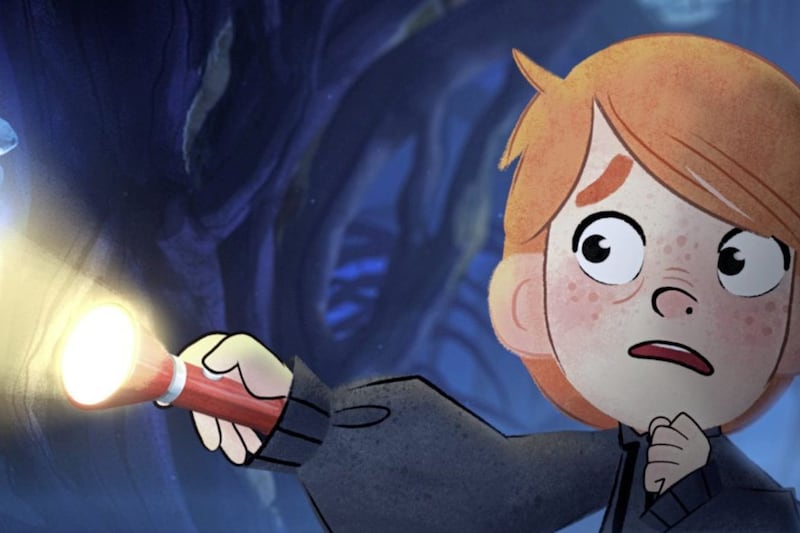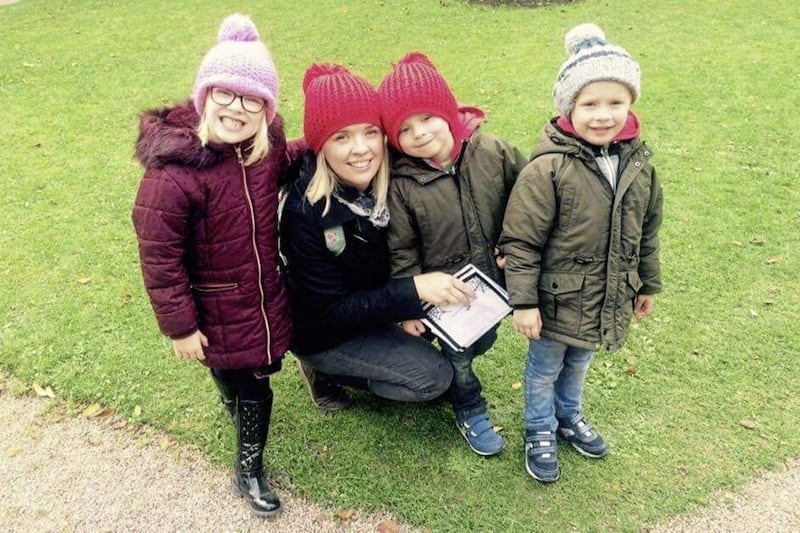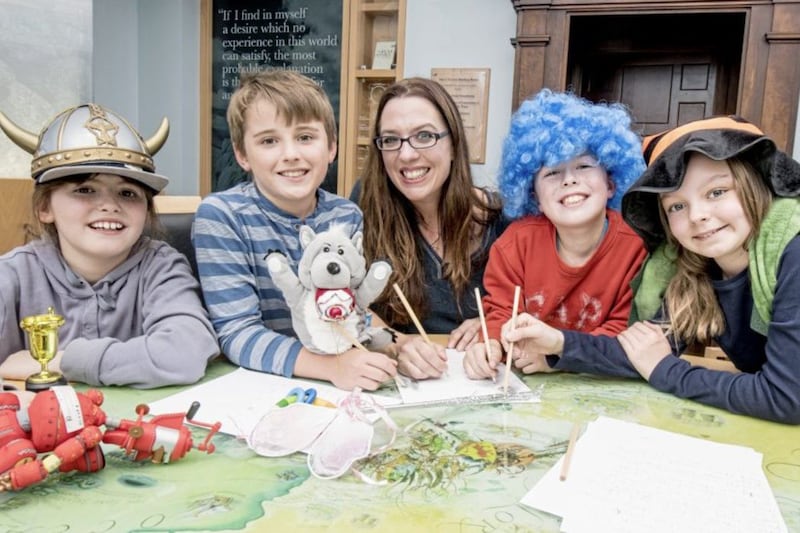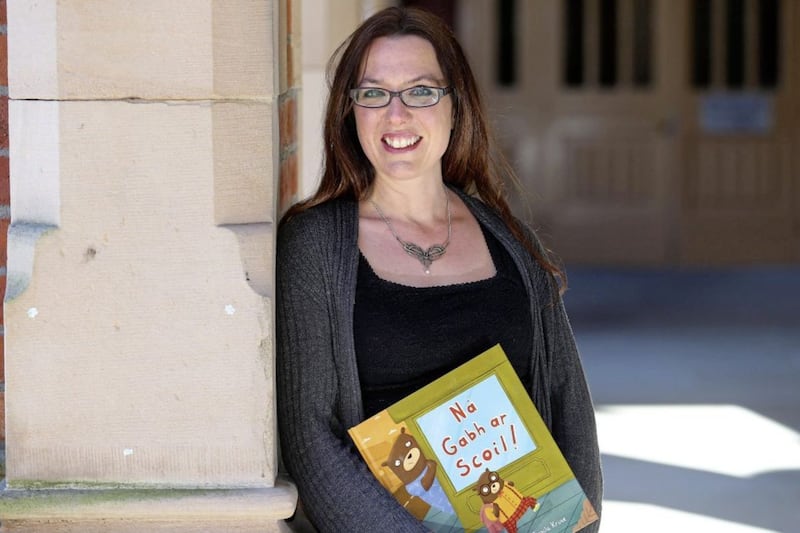Hi Myra. How did your role as Northern Ireland Children's Writing Fellow come about and what are your main goals during your time in position?
It was the collective brainchild of the Northern Ireland Arts Council and the Seamus Heaney Centre at Queen’s. They were looking for ways to honour Heaney’s legacy and had the brilliant idea to make children’s creative development a central part of that. The role comes with such a sense of responsibility, but in a good way. My mission is to get children reading and writing for pleasure – especially those kids who feel they can’t or that it isn’t for them.
The best way to do this is for them to experience the buzz of the creative mind themselves, so I will be busy with lots and lots of workshops and brainstorms to spark their own ideas. And a major new project involving primary schools across the north is almost ready to be launched.
What has been your highlight so far?
Two things that stand out are travelling to Hull for the announcement of the UK Children’s Laureate, Lauren Child, and launching the book written by 150 schoolchildren on both sides of the border for the Fighting Words project More Crosswords.
Are our schools doing enough to promote creativity and writing?
I am constantly impressed by the creativity I see blossoming in classrooms. However, often creative writing also has to be a vehicle for handwriting practice, punctuation and grammar skills and spelling. It means that many kids assume they aren’t creative, simply because they aren’t academic. We need to give kids that space – whether at school or at home – to be able to meander in their creative side without trying to achieve. Just like with reading, pleasure is so important in growing ideas and writing. Creativity is about the thought processes and those who think in pictures are often the most creative.
What is your advice to parents of reluctant readers?
One of the most important things is finding the right books. This doesn’t mean the books you think your child should be reading for their age, or the ones that you consider clever or worthy. It means finding something they like – whether that is graphic novels or toilet humour. Reading for pleasure is the magic key to reading. The other trick is to read aloud to them, and not just when they are little. This way, they can enjoy stories and language that they might not feel able to read themselves.
What is your earliest memory of books?
Curled up, safe and warm on a parent’s lap, reading and re-reading picture books. I was very lucky to grow up in a home full of books. We were raised speaking Irish and there wasn’t a huge selection of children’s books in Irish at that time in the 70s, so my dad used to translate them for us.
Who were your favourite children's authors and which children's authors do you enjoy sharing now?
As a child, I loved Gobbolino the Witch’s Cat (Ursula Moray Williams) and the Hounds of the Morrigan by Pat O Shea. And like most people my age, Roald Dahl loomed large.
Nowadays, I adored reading the How to Train your Dragon series by Cressida Cowell with my own children and the Harry Potter books of course. We still love picture books in my house – Dr Seuss and Oliver Jeffers and Mo Willems, but also picture books for older readers – Shaun Tan and David Wiesener.
Were you a fan of Seamus Heaney?
We read Death of a Naturalist at school. It was my first introduction to poetry, and I think, like a lot of people, before that I had assumed that poetry was something complicated or inaccessible. The more I hear and learn about Heaney as a man, the less it surprises me that his poems had the power to break through those barriers for me.
Can you fill me in on your career background?
I studied history at Oxford, and then moved to London where I worked in advertising. That was a really exciting time, and a steep learning curve – long hours, high stress and great parties. After that, I moved back home and wanted a job that would suit family life better and worked with a local Irish language group in Downpatrick, promoting the language.
The writing came later, when I was in the thick of full-time motherhood. I started writing a parenting column for a magazine called An tUltach. It grew from there, and my first book for kids was published in 2012.
What advice would you give budding young writers?
Encourage boredom and lots of time looking out the window. Kids today are so busy – between scheduled activities and the pull of screens – that they have very little time to allow their minds to freewheel. Any writer will tell you that this is the golden time for ideas to formulate. In the bath, on a car journey or just lying on your bed doing nothing is the space where things can grow.
What is the secret of a good story?
To write a good story, you have to be a little cruel. You write a good character that you care about and then you have to give them a problem. It can feel really mean sometimes. But without a problem to overcome, your story will fall flat. I think of the stories I wrote as a child where lovely people went to lovely places and did lovely things. I had to learn to channel my mean side to write better plots.
Can you tell me about your workshops at the Aspects Literature Festival in Bangor?
One of them is for younger children (4-6 year olds) based on my book Don’t Go to School. It will be good fun – think dressing up and games based on the story. In the workshop for older kids (7+) I will let them in on one of my favourite writing tricks for making funny stories. There will be no pens and no paper, but an epic brainstorm sparked by a sackful of props.
What are your own writing plans for the year ahead?
I love writing in both languages. I have lots of different irons in the fire just now, finishing a teen novel and having just received a commission to write a young adult title in free-verse. I have a brand new series of picture books about to hit the shops about a character called Rita. They are beautifully illustrated by the talented Andrew Whitson and published by An tSnáthaid Mhór. The first one is called Rita agus an róbat (Rita Wants a Robot). The US edition of Don’t Go to School! is doing well, and the UK/Ireland edition is due early in 2018.
:: Myra Zepf will be hosting two children's storytelling workshop on Saturday September 16 at North Down Museum, Bangor as part of the Aspects Literature Festival. For booking and full programme visit Aspectsfestival.com.








